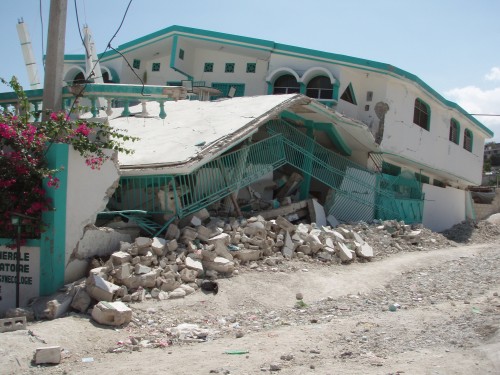
Earthquake
On January 12, 2010, a severe earthquake (magnitude 7.0 on the Richter scale) shattered the heart of Haiti and practically destroyed the capital city of Port-au-Prince. An estimated 270,000 people died, 300,000 were injured, and a million more were displaced. An entire nation affected. You’ve seen the images on TV. But let me tell you how it was on the ground… a different story.
Aftermath
I had the opportunity to go to Haiti and assist with earthquake relief in February 2010, arriving just a month after the earthquake. Having seen the images on the news, I braced myself for the worst… and I was surprised. Yes, the devastation was unimaginable. Yes, the loss of life and suffering of those who survived were horrendous. But I was surprised by the hope and the joy of those left behind spared from the rubble. So many people came up to thank me for helping them in their time of need. So many more struck me by their strength in the midst of pure chaos and devastation.
I was impressed with the dignity of the Haitian people and their unfailing hope for their struggling nation. Despite losing loved-ones and their homes in the earthquake, so many people told me they were blessed to be alive; to have some of their family remaining; to have a job to support themselves and their family; and told me that they were looking forward to seeing how God would use this incident to turn their country around for Good… As one of my fellow aid workers said,
“The Haitian people that I have had a privilege to meet have shown me that faith is for people who have recognized their weakness and found strength in the only place where true and enduring strength can be found.”
Help Arrives
After a long journey to get to Haiti (a red-eye flight to Florida, an entire day in an airport terminal, another flight to neighboring Dominican Republic where I spent a couple of nights awaiting transportation into Haiti, and finally a long eventful 12-hour bus ride with other medical relief workers to Port-au-Prince), I joined the relief team that I would be working with for the next 2 weeks, at a rate of 18-hour days 7 days a week. Food for the Hungry (FH) is a non-governmental organization based in Phoenix, AZ but has offices all over the world. They started doing relief work in the 1970s and had an office in Pétionville, in the outskirts of Port-au-Prince Haiti before the earthquake hit.
Haiti has been struggling since long before then, and FH had an HIV/AIDS program in place. When the earthquake happened, they were in a good position to offer immediate assistance. The FH team grew from 24 people at the time of the earthquake to 86 by the time I left Haiti, not counting the medical teams coming in and out from Canada and Korea.
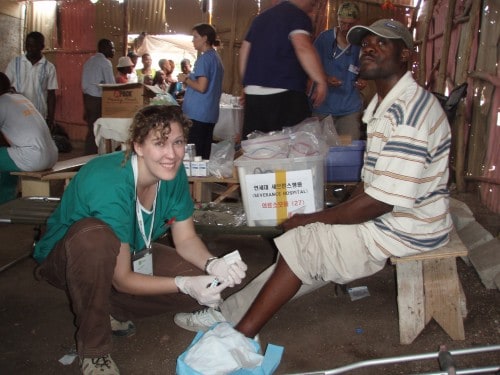
What did I do while I was there?
I started working with a medical team from FH Canada (3 doctors and 3 nurses) and we ran mobile medical clinics in some of the hardest hit (but neglected) areas of Port-au-Prince (PAP), seeing 350 to 400 patients a day. We would set up in the morning and work hard until about 4 pm when we would simply have to close up even though the line of people needing care never seemed to diminish.
Then we would drive around town trying to find the necessary supplies for the next day of the clinic. We’d take a short meal break and then start organizing supplies for the next day: packing pills into individual rations… splitting mebendazole tablets by hand (no pill cutters available! the simple things you miss in those circumstances) for pediatric doses… and debrief about the day as we worked until about midnight, sometimes even 1 or 2 AM. And then up again with the sun at about 6 AM, some breakfast, fill up our water bottles and make a small sandwich for a lunch/snack and off again for the day.
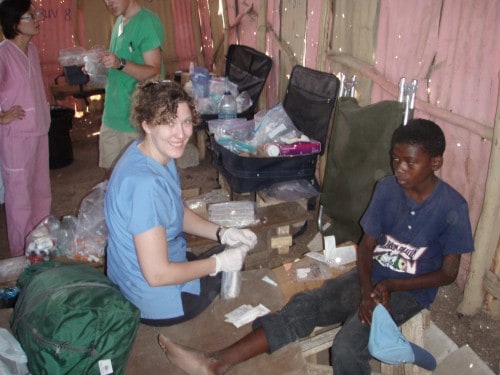
Once the Canadian team left, I continued my work of gathering medical supplies, preparing bundles of medical supplies & pharmaceuticals to deliver to various partner hospitals in the area that were still trying to function amidst great need and chaotic circumstances. I worked as a staff nurse for the growing number of FH workers (some internationals but mostly locals) and vaccinated some 86 people against meningitis in just 2 days, as well as provided medical care to those employees who needed it.
I worked on coordinating & preparing upcoming medical teams from the US and Canada by gathering and compiling the necessary (but not yet existing) briefing kit for medical teams (including what to bring, what to expect as far as traveling, lodging and working conditions, as well as all the logistical information and suppliers in PAP). I worked on gathering feedback from prior medical teams in order to share the information and learn from past experiences in order to better prepare the next teams to arrive.
I was the contact person for FH to link with the UN health cluster and attend the daily meetings at the new UN camp next to the airport whenever possible. I started networking and assessing the health needs and resources of the various target communities FH was working in.
And I started a project with a South-African supplier in order to build a temporary hospital in Siloe (one of the poorest and hard-hit neighborhoods of PAP, but also neglected by the major relief organizations as it was hard to access and unmapped). This supplier is able to provide modified shipping containers and set them up as medical exam rooms and even operating and delivery rooms.
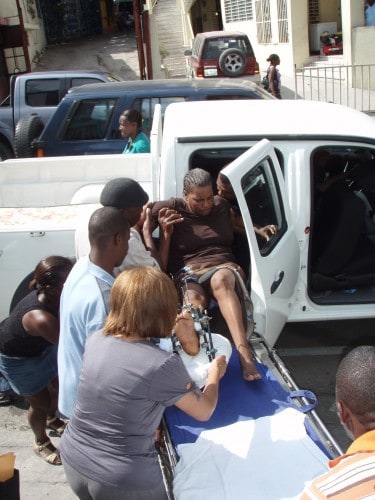
It was a very full 3 weeks (including travel days) with some interesting twists. Such as the day I was out with a pick-up truck delivering medical supplies to a hospital and was approached by an American doctor looking for some gauze and some injectable painkillers to prepare a patient suffering from a complex leg fracture for transport as she was to be airlifted out to Miami for surgery… so I started digging through the boxes of supplies
I had just packed and got him what he needed. And as the ambulance who was supposed to transport the patient to the airport never arrived, we ended up loading her into my pick-up truck which served as her ambulance that day. Or the morning I received a cooler filled with 100 vaccines which had just been driven across from the FH office in Santo Domingo (Dominican Republic) and needed to find ice STAT in order to preserve them from the sweltering heat until I could use them.
As most of you know, living in this area [San Jose, California], and perhaps remember how you felt in the events of Loma Prieta, a major earthquake isn’t an event that just stops… aftershocks continue for weeks and even months after the initial blow. While I was in Haiti, we experienced some pretty major tremors (4.7 and 4.5 on the Richter scale) which continued to do damage, both physically and emotionally, to people already suffering great loss.
And then, just as I was leaving, the rainy season was beginning a full month earlier than usual and flooding the camps of displaced people, causing more injury and loss. It’s been almost 5 months since the major earthquake, but the Haitian people still need much help in recovering and rebuilding their country.
You Can Help
You can help. Not everyone can take 3 weeks off work like I did to go to Haiti, but all of you can contribute to the relief efforts following major catastrophes like the one in Haiti, but also to others in the US and in the world. I encourage you to find out how you can help and get involved in your community. Also, I would like to use this opportunity to remind you about earthquake safety for yourself should a major event hit your area.
For more information visit:
Food for the Hungry
FH Relief blog
Partners in Health
Medical Teams International
American Red Cross
International Committee of the Red Cross
2 Responses to “Medical Volunteer – Helping after the Haiti Earthquake”
Leave a Reply
Tags: article, emergency relief, featured, haiti, volunteer travel

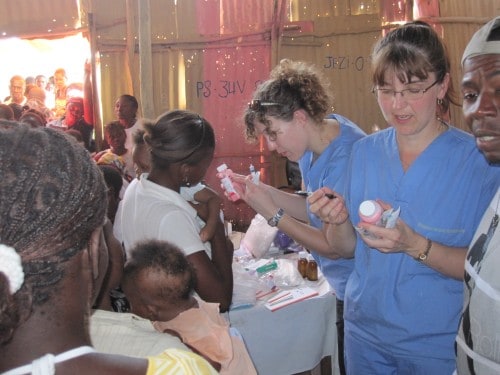
 Should Cruise Ships Go To Haiti? In Defense of Royal Caribbean
Should Cruise Ships Go To Haiti? In Defense of Royal Caribbean Travel to Haiti – Episode 455
Travel to Haiti – Episode 455


Marina K. Villatoro
Says:August 23rd, 2010 at 9:21 am
Wow… congrats that’s you did a great thing! And I’m glad to hear that the only thing those people didn’t lose was hope, that will be the most important part of their recovery. Great story!
Cathy
Says:August 30th, 2010 at 12:10 pm
What is being done with the displace people? Are they being provided with housing?